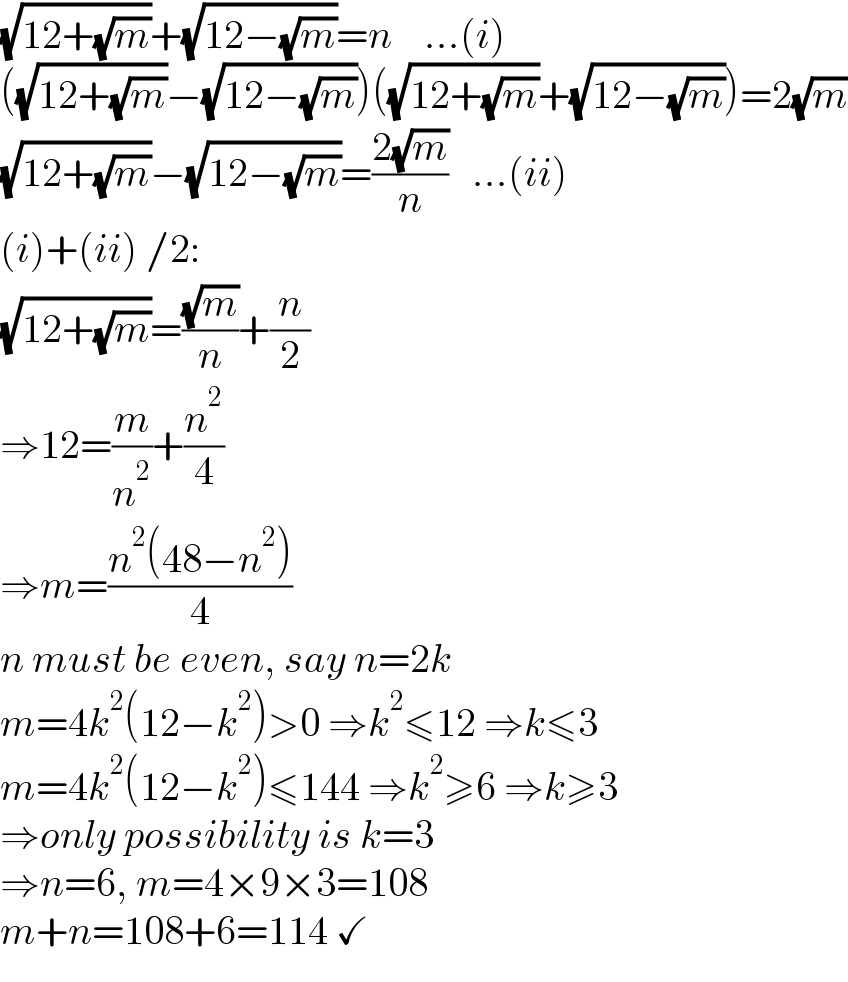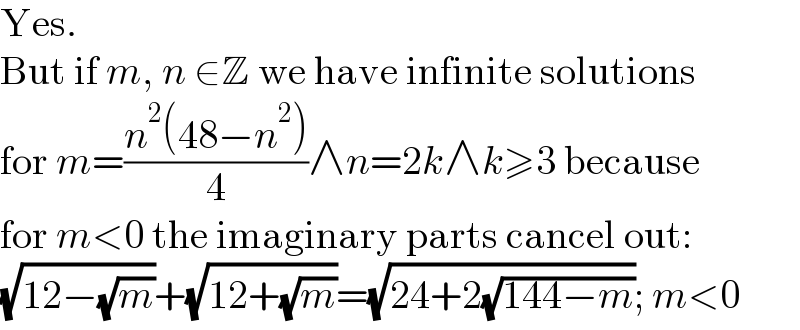
Question Number 196770 by Amidip last updated on 31/Aug/23

Commented by Frix last updated on 31/Aug/23

$$``\mathbb{N}\mathrm{atural}\:\mathrm{numbers}\:\left(\mathbb{Z}\right)''\:−\:\mathrm{really}?!? \\ $$
Commented by Frix last updated on 31/Aug/23

$$\mathrm{This}\:\mathrm{has}\:\mathrm{been}\:\mathrm{answered}. \\ $$$$\mathrm{Question}\:\mathrm{196637} \\ $$
Answered by mr W last updated on 31/Aug/23

$$\sqrt{\mathrm{12}+\sqrt{{m}}}+\sqrt{\mathrm{12}−\sqrt{{m}}}={n}\:\:\:\:...\left({i}\right) \\ $$$$\left(\sqrt{\mathrm{12}+\sqrt{{m}}}−\sqrt{\mathrm{12}−\sqrt{{m}}}\right)\left(\sqrt{\mathrm{12}+\sqrt{{m}}}+\sqrt{\mathrm{12}−\sqrt{{m}}}\right)=\mathrm{2}\sqrt{{m}} \\ $$$$\sqrt{\mathrm{12}+\sqrt{{m}}}−\sqrt{\mathrm{12}−\sqrt{{m}}}=\frac{\mathrm{2}\sqrt{{m}}}{{n}}\:\:\:...\left({ii}\right) \\ $$$$\left({i}\right)+\left({ii}\right)\:/\mathrm{2}: \\ $$$$\sqrt{\mathrm{12}+\sqrt{{m}}}=\frac{\sqrt{{m}}}{{n}}+\frac{{n}}{\mathrm{2}} \\ $$$$\Rightarrow\mathrm{12}=\frac{{m}}{{n}^{\mathrm{2}} }+\frac{{n}^{\mathrm{2}} }{\mathrm{4}} \\ $$$$\Rightarrow{m}=\frac{{n}^{\mathrm{2}} \left(\mathrm{48}−{n}^{\mathrm{2}} \right)}{\mathrm{4}} \\ $$$${n}\:{must}\:{be}\:{even},\:{say}\:{n}=\mathrm{2}{k} \\ $$$${m}=\mathrm{4}{k}^{\mathrm{2}} \left(\mathrm{12}−{k}^{\mathrm{2}} \right)>\mathrm{0}\:\Rightarrow{k}^{\mathrm{2}} \leqslant\mathrm{12}\:\Rightarrow{k}\leqslant\mathrm{3} \\ $$$${m}=\mathrm{4}{k}^{\mathrm{2}} \left(\mathrm{12}−{k}^{\mathrm{2}} \right)\leqslant\mathrm{144}\:\Rightarrow{k}^{\mathrm{2}} \geqslant\mathrm{6}\:\Rightarrow{k}\geqslant\mathrm{3} \\ $$$$\Rightarrow{only}\:{possibility}\:{is}\:{k}=\mathrm{3} \\ $$$$\Rightarrow{n}=\mathrm{6},\:{m}=\mathrm{4}×\mathrm{9}×\mathrm{3}=\mathrm{108} \\ $$$${m}+{n}=\mathrm{108}+\mathrm{6}=\mathrm{114}\:\checkmark \\ $$
Commented by Frix last updated on 01/Sep/23

$$\mathrm{Yes}. \\ $$$$\mathrm{But}\:\mathrm{if}\:{m},\:{n}\:\in\mathbb{Z}\:\mathrm{we}\:\mathrm{have}\:\mathrm{infinite}\:\mathrm{solutions} \\ $$$$\mathrm{for}\:{m}=\frac{{n}^{\mathrm{2}} \left(\mathrm{48}−{n}^{\mathrm{2}} \right)}{\mathrm{4}}\wedge{n}=\mathrm{2}{k}\wedge{k}\geqslant\mathrm{3}\:\mathrm{because} \\ $$$$\mathrm{for}\:{m}<\mathrm{0}\:\mathrm{the}\:\mathrm{imaginary}\:\mathrm{parts}\:\mathrm{cancel}\:\mathrm{out}: \\ $$$$\sqrt{\mathrm{12}−\sqrt{{m}}}+\sqrt{\mathrm{12}+\sqrt{{m}}}=\sqrt{\mathrm{24}+\mathrm{2}\sqrt{\mathrm{144}−{m}}};\:{m}<\mathrm{0} \\ $$
